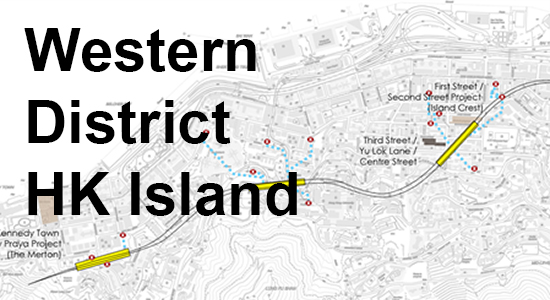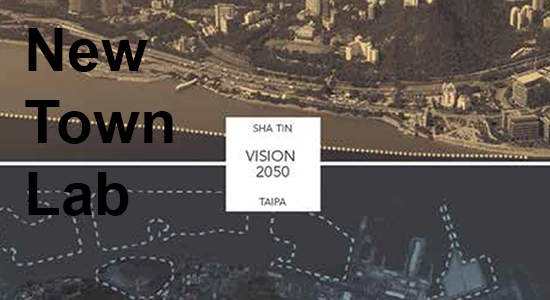Programme 2015-2016
The MSc in Urban Design Programme prepares students to make their contributions in developing sustainable communities and address pressing urban challenges of the 21st century. In recent years, policy makers, planners and designers investigated the potentials of mixed-use and high-density districts to respond to the challenges of climate change and decreasing resources. However, in many places, local communities react with concerns on the prospect of living closer together. Hong Kong and the Pearl River Delta region are perfect laboratories to explore the challenges and opportunities brought about by high-density urbanism.
In the two studios and the summer thesis for 2015-16 we will address these issues by looking at two different scales and conditions: The first studio will focus on the Western District and its transformation due to opening of the new MTR West Island Line. Here students will develop approaches for the regeneration of public spaces in collaboration with the local community. This studio will include a joint workshop with teachers and students of the University of Applied Science in Stuttgart (Germany).
The second studio will develop urban rules and designs for two currently planned new town extensions in Shatin (Hong Kong) and Taipa (Macau). This comparative studio will allow learning from the similarities and differences in both cities. This studio will offer the opportunity to radically rethink the design of urban districts together with their urban infrastructure and the design of artificial land reclamations. Other key elements of the programme are our international study trips providing the opportunity to experience different urban contexts and conditions. In 2015-16, we plan study trips to India and Europe.
Pre-term Workshop:
INTRODUCTION TO VISUALIZING URBANISM AND
URBAN DESIGN
August, 2015.
This one-week workshop is run as an introduction in producing and experimenting with urban information and visualizations, offering a short look into current representations, working methods and the visual culture in contemporary urbanism.
More information will follow.
Instructors: Chen Yongming
Term 1:

URBAN DESIGN STUDIO I:
URBAN INTEGRATION & MASS TRANSIT DEVELOPMENT
IN HIGH DENSITY OLDER URBAN DISTRICTS:
WESTERN DISTRICT, HONG KONG
Building on the research and studio work done on Sai Ying Pun last year, this year ‘s urban design studio focuses on West Island Line and the urban integration of the West Island Line currently under construction with the Western District of Hong Kong. This includes in addition to Sai Ying Pun, the Shek Tong Tsui and Pokfulum area and Kennedy Town. As the study area of the studio, as it currently faces strong forces of transformation due to the ongoing construction of the West Island Line and a public escalator system. Hong Kong’s role as sustainable urban model is closely linked to its highly efficient metro system (MTR) which boosts its vitality and helps to reduce vehicular traffic and carbon emission. Major investments are made to construct the new metro lines which offer the rare opportunity to fundamentally upgrade old districts, reorganize their traffic system and improve their public spaces. At the same time the construction of the new infrastructure increases development pressure and affects the spatial routine, social life and identity of the district. The impact of Western District in context of the construction of the new MTR stations should respond to the needs and aspirations of the community and increase the livability in this dense older urban district.
Instructor: Sujata GOVADA
Teaching Assistant: CHEN Yongming
(Read the course description here as PDF)
Term 2:

URBAN DESIGN STUDIO II:
NEW TOWN LAB - RE-SCRIPTING URBAN RULES FOR A SUSTAINABLE DISTRICT “SHATIN / TAIPA VISION 2050”
The studio will be conduced as a parallel studio with a common theme and two different sites one in Sha Tin Hong Kong and the other in Taipa Macau. The methodology of comparative studies will allow the students to explore different design approaches and learn from the comparison of two different sites with similar urban conditions.
Sha Tin: The projects should expand upon the original ideas of Sha Tin New Town, exploring how a new sustainable 21st century city should be planned and proposing ideas for envisioning Sha Tin in 2050. Of utmost importance in this context it is the integration of the new development into the existing conditions. Students will study a radical reconsideration of urban infrastructure in the city, and alternative solutions for land reclamation and design approaches for healthy living.
Taipa: The studio will focus on design proposals to create a masterplan integrating the planned yet-to-build-islands with Taipa waterfront. The islands will be conceived as a pilot case study for an ideal New Town whose urban principles, layout and infrastructural strategy should be able to influence the future development of Taipa Island at large. Students will be encouraged to rethink Macau’s practice of land reclamation and to question how to plan and design a sustainable District.
The studio is conceived as a New Town Lab exploring innovative strategies for a future sustainable district. Students will start by researching the Shatin model as well as outstanding contemporary urban developments, explore innovative design and planning approaches in the urban expansions of Taipa (Macau) and Ma Liu Shui (Hong Kong) and develop proposals contemplating new urban rules and guidelines.
Instructor: Nuno Soares